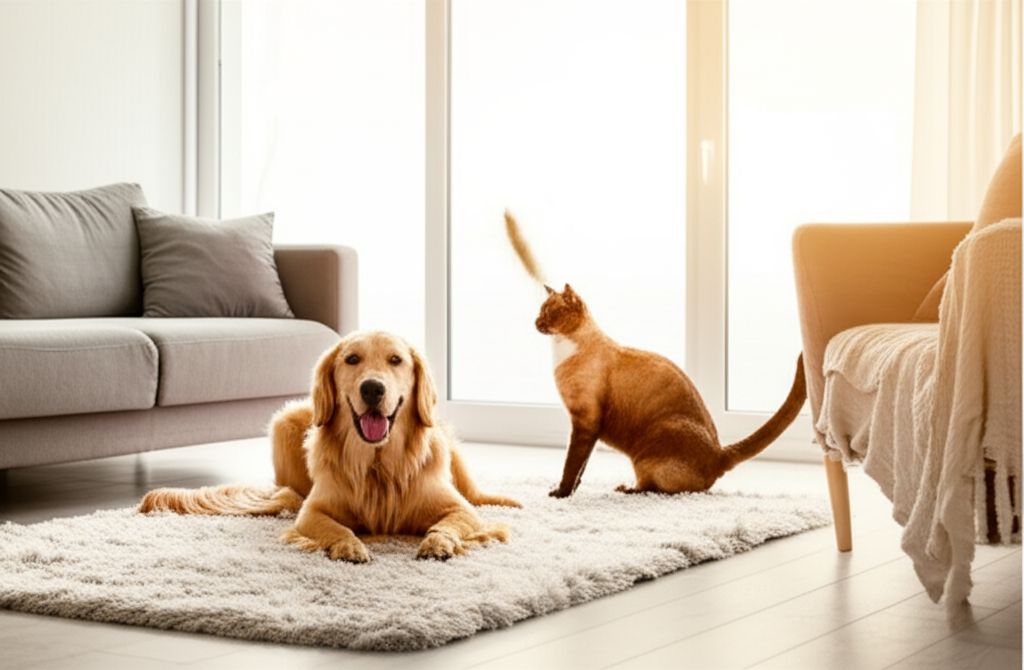In the competitive Fort Lauderdale real estate market, odors can significantly impact a property's marketability, showing experience, and ultimately, its selling price. As a real estate professional, addressing odor issues promptly and effectively is crucial for maximizing property value and minimizing time on market.
The Impact of Odors on Real Estate Sales
Odors affect property sales in several measurable ways:
First Impressions Matter
Research shows that potential buyers form their initial impression within the first 7-10 seconds of entering a property. Unpleasant odors can immediately create negative perceptions that are difficult to overcome, even if the property is otherwise perfect for the buyer.
Financial Impact
According to real estate studies:
- Properties with noticeable odors typically sell for 3-7% less than comparable odor-free properties
- Homes with odor issues spend an average of 30-50% longer on the market
- Nearly 50% of potential buyers will walk away from a property with noticeable odors without considering making an offer
South Florida's Unique Challenges
Fort Lauderdale's climate creates specific odor challenges for real estate professionals:
- High humidity: Amplifies existing odors and can reactivate dormant odors during showings
- Mold and mildew: More common in our climate and quickly detected by potential buyers
- Closed properties: Vacation homes or vacant properties that remain closed up develop musty odors rapidly in our humid environment
- Indoor/outdoor living: Our lifestyle means odors can transfer between indoor and outdoor spaces
Common Odor Issues in Fort Lauderdale Properties
Being able to identify common odor sources is the first step in addressing them:
1. Pet Odors
Pet odors are among the most common and problematic in real estate sales:
- Urine: Can penetrate carpets, padding, subflooring, and baseboards
- General pet smells: Dander, "wet dog" odor, and litter box smells
- Hidden damage: Often found under carpets or in corners
2. Smoke Odors
Particularly challenging because they penetrate deeply into:
- Wall paint and wallpaper
- Carpets and upholstery
- Drapes and window treatments
- HVAC systems and ductwork
3. Mold and Mildew
Common in South Florida properties, especially:
- Bathrooms with inadequate ventilation
- Properties that have been closed up
- Areas with previous water damage
- Older properties with aging HVAC systems
4. Kitchen Odors
Persistent cooking odors, especially from:
- Strong spices and oils
- Fish and other seafood
- Garbage disposals and under-sink areas
5. Musty/Stale Odors
Particularly common in:
- Vacant properties
- Seasonal homes
- Properties with poor ventilation
- Older properties with aging materials
Odor Assessment for Real Estate Professionals
Developing a systematic approach to odor assessment can help you address issues before they impact sales:
The "Fresh Nose" Approach
Our sense of smell adapts quickly to environments (olfactory fatigue). To combat this:
- Enter properties with a "fresh nose" - don't visit multiple properties in succession
- Ask a colleague to give their first impression
- Visit the property at different times of day (humidity levels change)
- Pay special attention when first entering after the property has been closed up
Systematic Inspection
Check these common problem areas:
- Carpets and flooring: Look for stains that might indicate odor sources
- Bathrooms: Check for mold/mildew around tubs, toilets, and sinks
- Kitchens: Inspect under sinks, inside cabinets, and around appliances
- Closets: Often overlooked but can harbor musty odors
- HVAC system: Check filters and returns for dust buildup or mold
- Baseboards and corners: Common areas for pet accidents
Effective Odor Removal Strategies for Real Estate
Based on the severity and type of odor, consider these approaches:
Level 1: Minor Odor Issues
For properties with mild, non-persistent odors:
- Thorough cleaning: Professional deep cleaning of carpets, upholstery, and surfaces
- Ventilation: Improve air circulation with fans and open windows
- HVAC maintenance: Replace filters and clean vents
- Natural deodorizers: Baking soda for carpets, white vinegar for surfaces
Level 2: Moderate Odor Issues
For more persistent odors that don't respond to basic cleaning:
- Carpet replacement: Consider replacing carpets and padding in affected areas
- Repainting: Use odor-blocking primers before applying fresh paint
- Duct cleaning: Professional cleaning of HVAC ductwork
- Enzymatic cleaners: For biological odors like pet urine
Level 3: Severe Odor Issues
For properties with significant, embedded odor problems:
- Professional odor elimination: Services like NoMoreOdors.com that use ozone treatment and specialized fogging
- Selective demolition: Removing affected drywall, subflooring, or cabinetry
- Encapsulation: Sealing odors in structural elements that cannot be removed
- Comprehensive approach: Combining multiple strategies for whole-house treatment
Professional Odor Elimination for Real Estate
When preparing high-value properties or addressing severe odor issues, professional services offer significant advantages:
Benefits of Professional Odor Elimination
- Comprehensive treatment: Addresses odors throughout the entire property, including hidden areas
- Permanent results: Eliminates odors at the molecular level rather than masking them
- Time efficiency: One-treatment process typically completed within 24 hours (total treatment time)
- Guaranteed results: Many services offer guarantees for their work
- Documentation: Professional documentation of odor remediation for disclosure purposes
The NoMoreOdors.com Approach for Real Estate Professionals
Our specialized service for real estate professionals includes:
- Pre-listing assessment: Identifying potential odor issues before they impact showings
- Flexible scheduling: Working around showing schedules and closing timelines
- Discreet service: Maintaining professional appearance and confidentiality
- One-treatment process: Typically completed within 24 hours (total treatment time)
- Documentation: Providing treatment certificates for your records
- Guaranteed results: Our 15-day odor-free guarantee ensures buyer satisfaction
Staging Strategies After Odor Elimination
After addressing odor issues, these staging strategies can enhance the fresh environment:
- Natural ventilation: Open windows when weather permits to maintain fresh air flow
- Subtle, natural scents: Consider light citrus or herbal scents (avoid heavy artificial fragrances)
- Fresh flowers: Small arrangements of fresh flowers add visual appeal and subtle natural fragrance
- Clean linens: Fresh towels in bathrooms and clean bedding create a sense of cleanliness
- Avoid cooking: Advise sellers to avoid cooking strong-smelling foods before showings
Disclosure Considerations
Understanding disclosure requirements regarding odors and their remediation is important:
- Previous issues: In most cases, disclosed odor problems that have been professionally remediated are not concerning to buyers
- Documentation: Keep records of all professional treatments and remediation
- Underlying causes: Always disclose and address the causes of odors (water damage, etc.)
- Consult your broker: When in doubt about disclosure requirements, consult with your managing broker
Conclusion
In Fort Lauderdale's competitive real estate market, addressing odor issues promptly and effectively can significantly impact property values and time on market. By understanding common odor sources, implementing appropriate remediation strategies, and partnering with professional odor elimination services when needed, you can ensure your listings make the best possible impression on potential buyers.
At NoMoreOdors.com, we specialize in helping real estate professionals present odor-free properties to the market. Our one-treatment process, typically completed within 24 hours (total treatment time), ensures your listings are showing-ready quickly and effectively. Contact us today to learn more about our specialized services for real estate professionals.




